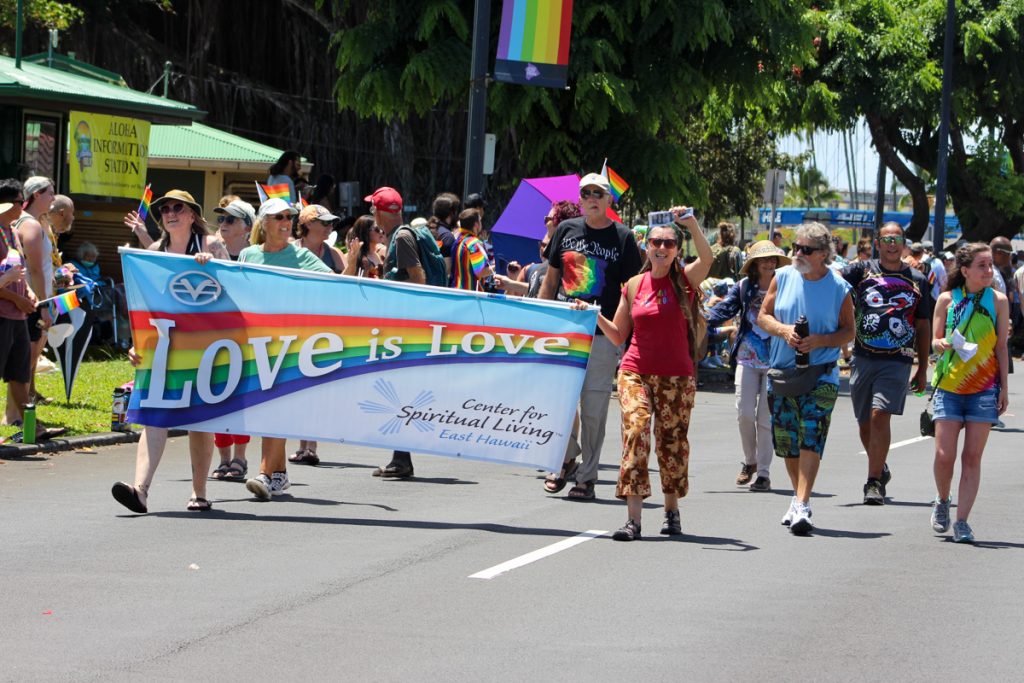What’s the biggest issue facing the LGBTQ+ community on the Big Island?
As of June 1, the first day of Pride Month, more than 520 bills had been introduced in state legislatures throughout the country targeted at restricting the rights — and lives — of people in the lesbian, gay, bisexual, transgender, questioning, plus community. A total of 74 measures had been enacted.

That’s according to the Human Rights Campaign, the largest LGBTQ+ civil rights organization in the nation, which is tracking:
- More than 125 gender-affirming care bans, measures that would prevent transgender and non-binary youth from accessing supportive health care.
- 30-plus anti-transgender bathroom bills.
- More than 100 anti-LGBTQ+ curriculum censorship bills, similar to a Florida mandate that critics call the “Don’t Say Gay” law which prohibits classroom discussion about sexual orientation or gender identity in certain grade levels or in a specified manner.
- 45 measures that would ban drag queen performances.
Fortunately, Hawai‘i is bucking that trend and expanding equality and protecting the rights of the state’s LGBTQ+ community, and the Human Rights Campaign includes the island state among those working toward innovative equality.
So when Big Island Now asked in its most recent poll last week what people thought was the biggest issue now facing the LGBTQ+ community on the Big Island, it’s not so surprising that most votes, or 52 percent, went to not knowing or it doesn’t affect people here.
Recent examples of policies passed by the state Legislature include a trio of measures signed into law last year by former Gov. David Ige. One of them was the Gender Affirming Treatment Act, which prohibits insurance providers from excluding gender-affirming treatments when medically necessary and requires health plans to provide information about gender transition services.
Hawai‘i law also explicitly prohibits discrimination in employment, public accommodations and housing based on sexual orientation and gender identity or expression. Lawmakers expanded on that in 2018 when they passed legislation that protects Hawai‘i students in a school or education program that receives state funding from discrimination based on sex, gender identity or sexual orientation.
That doesn’t mean, however, that the LGBTQ+ community here doesn’t face challenges. The second most popular response to Big Island Now’s poll, with 24 percent, was hate crimes/violence with “Don’t Say Gay” laws coming in third at 5 percent.
Here are the full poll results:
- I don’t know; it doesn’t affect me: 228 (52%).
- Hate crimes/violence: 105 (24%).
- “Don’t Say Gay” laws: 22 (5%).
- Banning of LGBTQ+ books in public schools and libraries: 19 (4%).
- Transgender health care bans: 12 (2%).
- Employment inequality: 12 (2%).
- Anti-drag queen laws: 10 (2%).
- Housing discrimination: 10 (2%).
- Exclusion from organized or professional sports: 8 (1%).
- Education inequality: 6 (1%).
Total votes: 432.
While many of the choices in the poll are issues in several states on the mainland, which one person commenting on the poll pointed out, the backlash from the anti-LGBTQ+ movement in those places does affect members of the LGBTQ+ community here.
Keiva Lei Cadena, director of harm reduction services and community engagement for Kumukahi Health + Wellness, said just seeing that discrimination — and hate — elsewhere can lead LGBTQ+ people here isolating themselves, especially those still learning about themselves and not yet confident enough to be their own advocate.
Some of the comments on the poll question and Big Island Now’s coverage of the 11th annual Hawai‘i Island LGBTQ+ Pride Parade and Festival on June 24 in Downtown Hilo, with this year’s theme of “Fabulous Free Future” crafted in response to the seemingly growing anti-LGBTQ+ sentiment throughout the United States, also show that there’s more work to do.
Words such as perverts and pedophilia were used to describe people in the LGBTQ+ community. Doug Arthur, commenting on the Facebook link to Big Island Now’s story about this weekend’s Pride festivities, said: “A fabulous free future for pedos, groomers and other perverts.” Another commenter, David Iggy, called the event a “FREAK show.”
Not all commenters jumped on that bandwagon, however.
While he doesn’t think sexuality of any kind should be expressed in any way to kids, Rick said in response to one of the comments on last week’s poll: “I think it’s unfortunate you need to call people perverts because they like something you don’t. Hawai‘i is a place that everyone is vastly different and the majority of us do our best to respect the other guy.”
Sponsored Content
Comments







